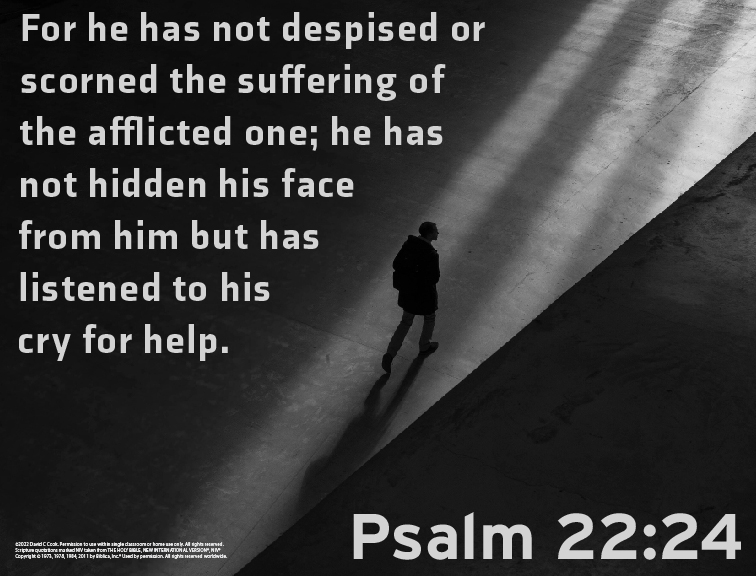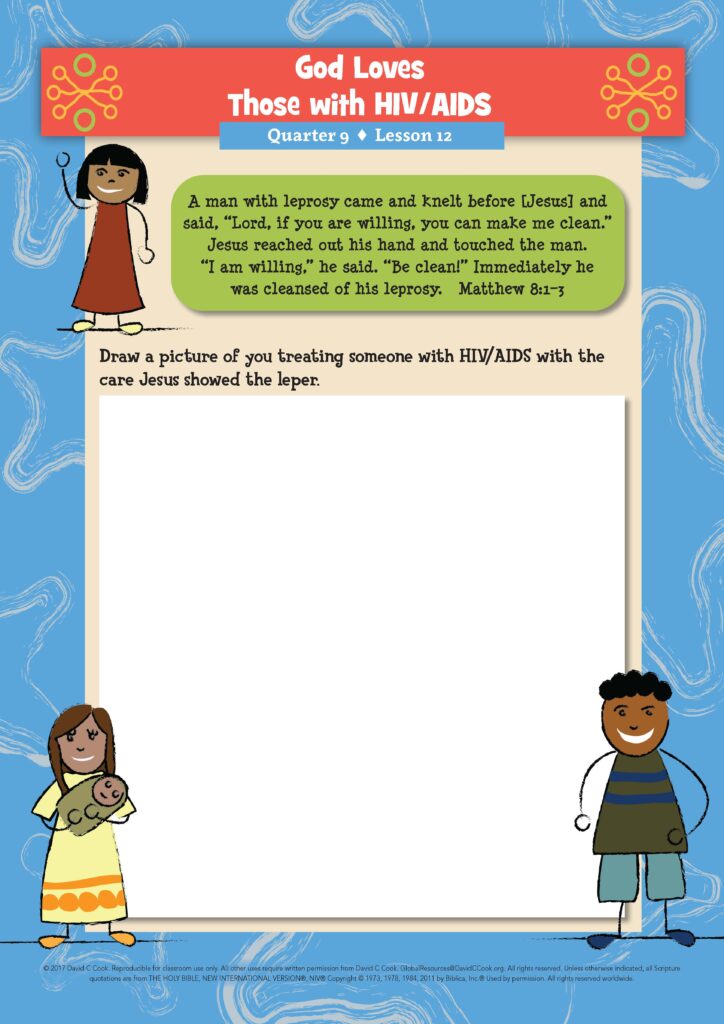During the lesson, the information for you to know is written in regular type, and what we suggest speaking or reading aloud to children is in bold. All resources for this lesson, including the Teacher Guide, Student Page, Family Connection Card, and other resources can be downloaded in a ZIP file by clicking on the following link:
In some lessons you will find "resource articles." These are articles written by experts from around the world to help equip you for your work with children and adolescents. Share them with parents or guardians if you consider it appropriate.
Anyone who withholds kindness from a friend forsakes the fear of the Almighty.
Job 6:14
When someone has a disease like HIV/AIDS, it may be easy for people to shun him or treat him unkindly. We may avoid people with the disease because we fear getting it ourselves. We may judge those with the disease because there is a social stigma attached to it. In the Bible, Job faced this kind of dishonour from his friends when he sat in grief and illness. They judged him and kept him at a distance, even while sitting with him. Yet Job spoke rightly when he said that withholding kindness means we are forsaking God’s way.
As you read through these lessons about HIV/AIDS, pause and consider your own heart toward those with the disease. Is there anything you have wrongly believed to be true about people who suffer from HIV/AIDS? Have you judged them instead of offering them kindness? Ask God for forgiveness. Ask Him to give you His heart for those suffering from this difficult disease.
Let the children’s families know that today the children will learn more about HIV/AIDS and how to act kindly toward those with this disease. Encourage the children to share how Jesus showed kindness to those with the disease of leprosy
Teacher Tip: If possible, email or text the Family Connection Card to the families of your students.
Today’s lesson will teach the children a new way of looking at people with HIV/AIDS. This disease carries many stigmas. This lesson will teach your children how to respond with compassion.
Today we will continue to learn about the immune system and how it responds to HIV/AIDS. Do you remember the game we played where the white blood cells surrounded the germ cells and removed them? That game showed how our immune system keeps us healthy.
Tell the children to stand in a line in the middle of your teaching area. There should be space on either side of the line of children, so they can move. Stand facing them.
Today we will play a fun game to review what we have already learned about HIV/AIDS. I will make a statement. Then, when I say, “Jump!” you will jump. If you think the statement is true, jump to your right. If you think the statement is false, jump to your left. Stay where you are until I tell you the answer. Then everyone will get back into the line for the next statement.
Read each statement below, and then say, “Jump!” Once the children decide the answer and jump, reread the statement and tell them if it is true or false. If it is false, tell them why it is false and what the truth is.
Clap for the children doing well in the review game. Ask them to sit down.
We have talked a lot about HIV. Now we will talk about AIDS in more detail. AIDS stands for Acquired Immune Deficiency Syndrome. That means the disease causes the immune system to stop working the way it was designed to.
We learned how the white blood cells work. They destroy bad cells that could harm the body. When the white blood cells do not work well, such as when someone has HIV, the bad cells damage the body. When the immune system breaks down completely, HIV becomes AIDS. AIDS makes your body vulnerable to many diseases that a healthy person can recover from. For example, cancers, tumours, and infections develop because the white blood cells cannot destroy them.
Medications and treatments are available to help people with HIV/AIDS. Medication can sometimes help fight against HIV/AIDS and help strengthen the immune system. Sometimes this is hard for the person because there are so many expensive medications that must be taken many times each day. But it is important to follow the instructions for the medicines so they can work well.
There are also many treatments for the different diseases that result from AIDS. Some people need operations to remove tumours. Some people need strong medicines to fight infections. Sometimes people need to stay away from crowds where they might be exposed to cold and flu germs. They might even need to wear masks to keep from breathing in germs their bodies cannot protect them against. But with medication and treatment, many people can live long lives with HIV/AIDS.
There is a serious disease called leprosy. It is talked about in the Bible. You may have heard about it because people still suffer from this disease today. According to the Jewish law, people who suffered from leprosy could not live in the community, and they were not allowed to touch anyone. It is a terrible disease, and those who have it suffer from the disease physically and emotionally.
Listen to what happened when a man with leprosy came to Jesus for healing.
When Jesus came down from the mountainside, large crowds followed him. A man with leprosy came and knelt before him and said, “Lord, if you are willing, you can make me clean.” Jesus reached out his hand and touched the man. “I am willing,” he said. “Be clean!” Immediately he was cleansed of his leprosy.
Matthew 8:1–3
How did Jesus respond when the leper asked to be healed?
He said, “I am willing. Be clean.” Then He healed the leper.
How did Jesus heal the leper?
Jesus touched him.
Did it surprise you that Jesus touched the sick man? Why or why not?
According to the Jewish law, people were not allowed to touch lepers. But Jesus touched this man and healed him. What an amazing thing for Jesus to do! He knew that the man needed to be healed physically, so Jesus healed him. But Jesus also knew that the man was hurting emotionally, so Jesus showed His love by touching the leper.
God loves all people, including those who have HIV/AIDS. He wants us to show respect and kindness to everyone, including those with HIV/AIDS
Many people do not show kindness to people who have HIV/AIDS. These people may avoid those with HIV/AIDS or mistreat them because they are afraid of getting the disease or think that the disease was caused by the infected person’s poor choices. But you cannot get HIV/AIDS by spending time with someone who is infected. And you should never treat someone cruelly. God tells us to treat everyone with love and kindness. Do you remember this verse we read last week about how God responds to those who are sick?
Read the following verse again from your Bible.
If you are using the Memory Verse Poster, show it to the students.
For he has not despised or scorned the suffering of the afflicted one; he has not hidden his face from him but has listened to his cry for help.
Psalm 22:24

You may have unkind thoughts when you look at someone with HIV/AIDS. You or someone you know may have this disease, and you may have many confused or intense feelings about it. Someone may have said or done hurtful things to you because you have this disease.
You may be afraid of those with HIV/AIDS or judge them because you think they did something wrong to get this disease. You may feel it is okay to reject them, mistreat them, or avoid them. But this is not what Jesus taught us to do.
Jesus spent time with people who were sick. Jesus did not reject them or mistreat them. He touched them and cared for them. He loved them. And He loves those with HIV/AIDS.
If you have HIV/AIDS or someone you know does, remember that God loves all people, including those with HIV/AIDS. His love does not stop or change because a person has a disease. His love for us never ends!
Have your thoughts about people with HIV/AIDS changed after these lessons? If so, in what way?
Pass around the bag of pebbles, sticks, and leaves and tell each child to pick 1 item out of the bag. Once each child has an item, ask a child to choose another item from the bag and give it to you. Show the children the item you were given. Tell the children who have this same type of item to stand up.
Everyone who is standing has HIV/AIDS. You may have been infected by something you did, such as having sexual relations with an infected person. Or you may have been infected through no fault of your own, such as being born to an infected mother. Please stay standing.
Choose a child who is not standing. Have her stand up and show her item. Tell all the children who have the same item as this child to stand.
Everyone who just stood up was infected with HIV/AIDS by someone already standing. Again, you may have been infected because of something you did or through no fault of your own. Please stay standing.
Everyone who is sitting is healthy. You do not have HIV/AIDS.
Optional: If you are using the Student Pages, the children can draw themselves showing compassion on them.

Think about those with HIV/AIDS and how you treat them. Think about how Jesus responded to the man with leprosy. Spend a few minutes asking Jesus to help you respond to those who have HIV/AIDS with the same love and respect that Jesus showed the man with leprosy. If you do not feel comfortable praying, think about how Jesus’ example can help you to change your attitude.
To close class today, speak this blessing based on Psalm 22:24 over the children.
Blessing: May God, who does not hate or ignore the suffering, fill you with kindness and compassion for those who cry out to Him for help.
Lead the children in singing this quarter’s song, if possible. (soft return here)
Life on Life ©2020 David C Cook. Reproducible for home or classroom use only. All other uses require written permission from David C Cook [email protected]. All rights reserved.